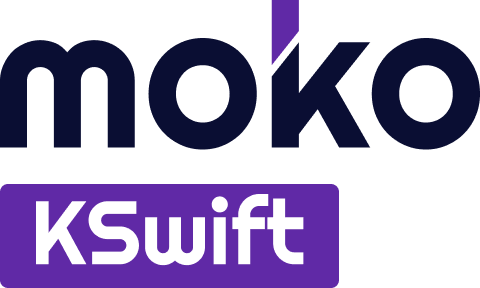MOKO KSwift
KSwift it's gradle plugin for generation Swift-friendly API for Kotlin/Native framework.
Kotlin sealed interface/class to Swift enum

Kotlin extensions for K/N platform classes

Your own case
KSwift give you API for adding your own generator based on KLib metadata information.
Posts
Table of Contents
Features
- API for extend logic for own cases - just implement your own
ProcessorFeature - Reading of all exported klibs - you can generate swift additions to the api of external
libraries - Kotlin sealed class/interface to Swift enum
- Kotlin extensions for platform classes to correct extensions instead of additional class with
static methods - Flexible filtration - select what you want to generate and what not
Requirements
- Gradle version 6.0+
- Kotlin 1.5.20
Installation
Plugin
Using legacy plugin application
root build.gradle
project where framework compiles build.gradle
Using the plugins DSL
settings.gradle
project where framework compiles build.gradle
Runtime library
root build.gradle
project build.gradle
Usage
Sealed classes/interfaces to Swift enum
Enable feature in project build.gradle:
kotlin:
groovy:
That's all - after this setup all sealed classes and sealed interfaces will be parsed by plugin and
plugin will generate Swift enums for this classes.
For example if you have in your kotlin code:
Then plugin will generate source code:
For each generated entry in comment generated selector - value of this selector can be used for
filter. By default all entries generated. But if generated code invalid (please report issue in this
case) you can disable generation of this particular entry:
kotlin:
groovy:
As alternative you can use includeFilter to explicit setup each required for generation entries:
kotlin:
groovy:
Extensions from platform classes
Enable feature in project build.gradle:
kotlin:
groovy:
That's all - after this setup all extension functions for classes from platform.* package will be
correct swift code.
For example if you have in your kotlin code:
Then plugin will generate source code:
Selector from comment can be used for filters as in first example.
Implementation of own generator
First create buildSrc, if you don't. build.gradle will contains:
Then in buildSrc/src/main/kotlin create MyKSwiftGenerator:
in this example will be generated swift extension for each class in kotlin module. You can select
required Context to got required info from klib metadata.
last step - enable feature in gradle:
kotlin:
groovy:
Set iOS deployment target for podspec
kotlin:
groovy:
FAQ
Where destination directory for all generated sources?
Swift source code generates in same directory where compiles Kotlin/Native framework. In common case
it directory
build/bin/{iosArm64 || iosX64}/{debugFramework || releaseFramework}/{frameworkName}Swift.
Kotlin/Native cocoapods plugin (and also mobile-multiplatform cocoapods plugin by IceRock) will move
this sources into fixed directory - build/cocoapods/framework/{frameworkName}Swift.
How to exclude generation of entries from some libraries?
How to generate entries only from specific libraries?
Samples
More examples can be found in the sample directory.
Set Up Locally
Clone project and just open it. Gradle plugin attached to sample by gradle composite build, so you
will see changes at each gradle build.
Contributing
All development (both new features and bug fixes) is performed in develop branch. This
way master sources always contain sources of the most recently released version. Please send PRs
with bug fixes to develop branch. Fixes to documentation in markdown files are an exception to
this rule. They are updated directly in master.
The develop branch is pushed to master during release.
More detailed guide for contributers see in contributing guide.
License
Copyright 2021 IceRock MAG Inc
Licensed under the Apache License, Version 2.0 (the "License");
you may not use this file except in compliance with the License.
You may obtain a copy of the License at
http://www.apache.org/licenses/LICENSE-2.0
Unless required by applicable law or agreed to in writing, software
distributed under the License is distributed on an "AS IS" BASIS,
WITHOUT WARRANTIES OR CONDITIONS OF ANY KIND, either express or implied.
See the License for the specific language governing permissions and
limitations under the License.





